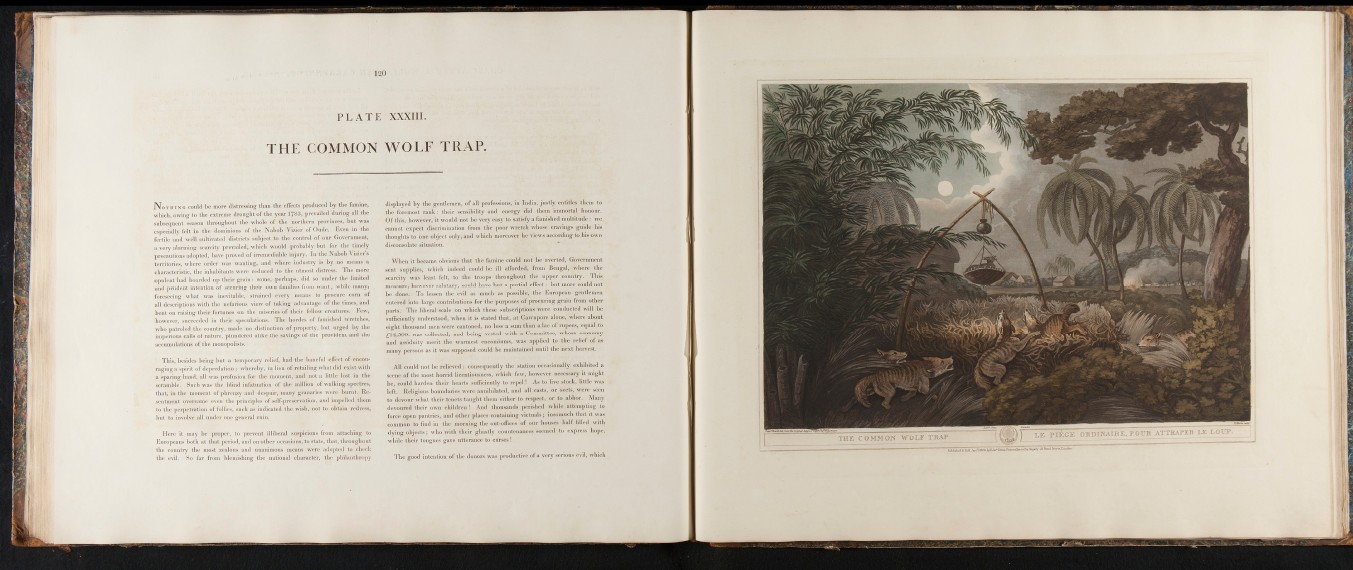
120
P L A T E XXXIII.
THE COMMON WOLF TRAP.
NOTHING could ])c more distressing than the effects produced b y the famine,
ivliich, owing 10 llie cxircine dronglil of tlic year 1 / 8 3 , prevailed during all tlie
subscqiionl. season tliroiiglioul the -whole of the northern provinces, but was
e s p e c i a l l y felt in llie dominions of the Nabob Vizier of Oude. Even in the
f e r t i l e and -well cultivated dislricts subject to the control of our Government,
a very alarming scarcity prevailed, which would probably but for the timely
precautions adopted, liave proved of irremediabl e injury. Tn the Nabob Vizier's
territories, where order was wanting, and where iuduslry is by no means a
c h a r a c t e r i s t i c , the inhabitanls were reduced to the utmost distress. The more
opulent bad hoarded up their grain: some, perhaps, did so under the limited
and j>rndent intention of securing their own families from want; while niany,
f o r e s e e i n g what was inevitable, strained every means to procure corn of
all descriptions with the nefarious view of taking advaulage of the limes, and
I j e n t on raising their fortunes on the miseries of their fellow creatures. Few,
however, succeeded in their speculations. The hordes of famished wretches,
who patroled the country, made no distinction of properly, but urged by the
imperious calls of natiire, plundered alike the savings of the ¡¡rovident and the
accumulations of the monopolists.
T h i s , besides being but a temporary relief, had the banefid eiiect of encour
a g i n g a spirit of depredation ; whereby, in lieu of retailing what did exist with
a sparing hand, all was profusion for the moment, and not a little lost in the
scramble. Such was the blind infatnalion of the million of walking spectres,
l h a t , in the moment of phrenzy and despair, many granaries were burnt. Resentment
overcame even the principles of self-preservation, and impelled them
to the perpetration of follies, such as indicated the wish, not to obtain redress,
but to iiivolve all under one general ruin.
H e r e it may be proper, to prevent illiberal suspicions from attaching U,
E u r o p e a n s both at lhat pei'iod, and on other occasions, to slate, thai, throughout
the counti-)' the most zealous and unanimous means were adopted lu check
the evil. So far from blemishing ihe natioual character, the pliilanLliropy
displayed b y the gentlemen, of all professions, in India, justl y entitles them to
t h e foremost rank : their sensibility and energy did them immortal honour.
O f this, however, it would not be veiy easy to satisfy a famished multitude : we
cannot expect discrimination from tiie poor wretch whose cravings guide his
t h o u g h t s to one object only, and which moreover he views according to his own
disconsolate situation.
"When it became obvious lhat the famine conld not be averted. Government
sent supplies, which indeed couki lie ill afforded, from Bengal, -w h e r e the
s c a r c i t y was least felt, to the troops throughout the upper country. This
measure, liovvever salutary, conld have but a partial effect: but more could not
b e done. To lessen the evil as much as possible, the European gentlemen
entered into large contributions for ihe purposes of procuring grain from other
p a r l s . The liberal scale on which these subscriptions were conducted will be
s u f f i c i e n t ly understood, when it is stated lhat, at Cavvnpore alone, where about
e i g h t thousand men were cantoned, no less a sum lhan a lac of rupees, equal to
.500. was collected, and being vested with a Connnittee, whose economy
and assiduity merit the warmest encomiums, was applietl to the rebel of as
many persons as it was supposed could be maintained until the next harvest.
All could not be relieved : consequently the station occasionally exhibited a
scene of t.he most horrid liccntioiisness, \vbich few, however necessary it might
be, could harden their hearts sufficiently to repel ! As to live stock, little was
l e f t . Religious boundaries were annihilated, ami all casts, or sects, wci-e seen
t o devour \vhaL their tenets taught them either to respect, or to abhor. Many
devoured their own children ! And thousands perished while attempting to
f o r c e o])eu ])antrics, and other places containing victuals; insomuch thai it was
common to iind in the morning the out-offices of our houses lialf filled wilh
d y i n g objects; who with their ghastly countenances seemed to expre.ss hope,
w h i l e their tongues gave utterance to curses!
T h e good inlention of the donors was productive ol' a very soric , which